Illegal logging in Brazil turns Amazon into a powder keg
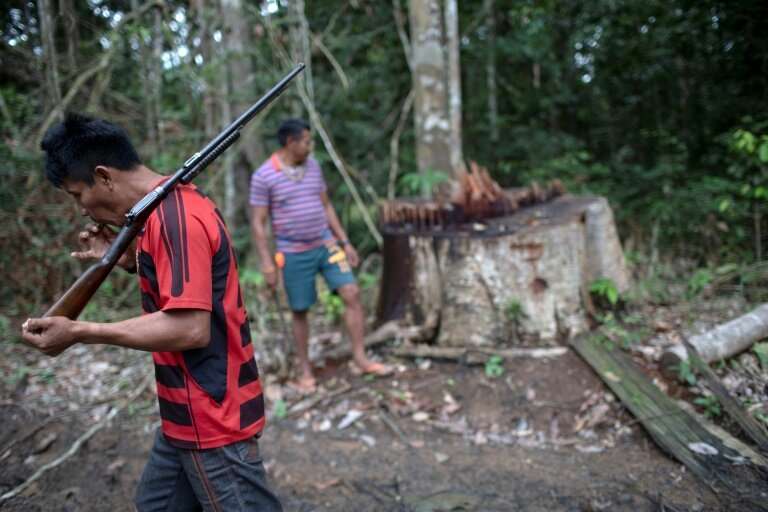
A rifle resting on his shoulder, Tatji Arara looks despondent as he steps over the trunks of huge trees felled by timber traffickers in the heart of Brazil's Amazon rainforest, now the scene of numerous land conflicts.
"Every day, we find new trees cut down. I've never seen anything like this," laments the 41-year-old, a leader of the Arara indigenous people in the northern state of Para.
He says illegal logging on Arara lands—an area equivalent to 264,000 football fields—has intensified since President Jair Bolsonaro came to power in January.
Bolsonaro, a far-right champion of agribusiness, vowed during last year's election campaign that he would not give up "one centimeter more" of land to indigenous communities in Brazil, home to around 60 percent of the Amazon rainforest.
According to Para-based conservation group Imazon, deforestation in the Amazon increased 54 percent in January—the first month Bolsonaro was in office—as compared with a year earlier.
Some 37 percent of the devastated areas are in Para.
The Arara territory, where around 300 indigenous live, has been under government protection since 1991.
But there are fears that could change under Bolsonaro, a climate change skeptic.
"Bolsonaro is poisoning the spirit of the people. Lots of people think he will take our land, but we won't let him," says Tatji Arara, wearing shorts and a team shirt for Flamengo, one of Brazil's most popular football clubs.
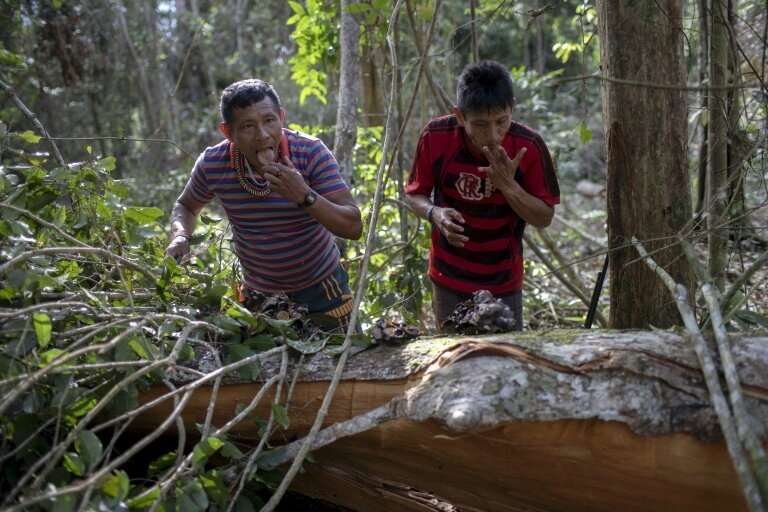
"If the illegal extraction of wood continues, our warriors will take up their bows and arrows. There could be deaths," he warns.
In a letter to the local federal prosecutor's office in February, the Arara said tribal elders were considering "getting justice for themselves," including evoking an ancestral ritual of making a traditional flute "with the skulls of the invaders."
Hundreds of representatives of indigenous groups will convene in the nation's capital Brasilia for three days starting Wednesday for their annual lobbying mission to defend their land rights.
Brazen looting
The Arara lands are technically part of the municipality of Altamira, the largest in Brazil in terms of surface area—bigger than Portugal—and home to about 110,000 people.
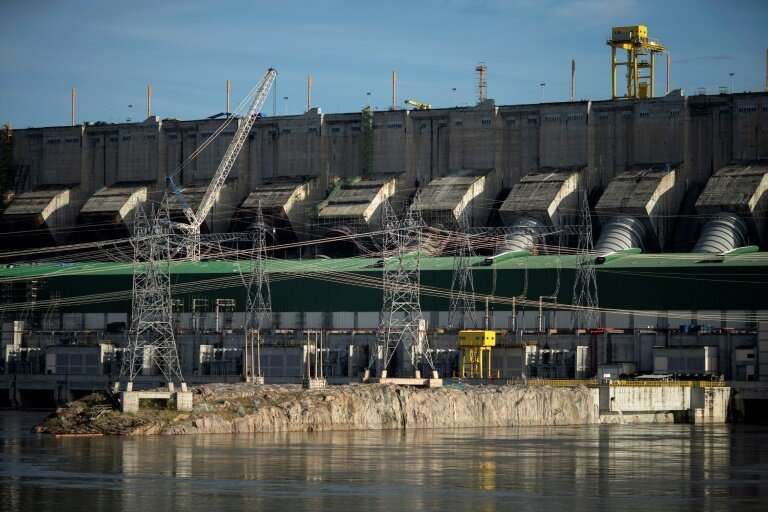
Before illegal logging ramped up, local indigenous communities had already suffered—in the name of modernization.
The construction of the Belo Monte hydroelectric mega-dam project on the Xingu River, which is due to be finished this year and will be one of the biggest in the world, displaced dozens and disrupted the ecosystem.
It was also in Altamira that Brazil's military regime began constructing the Trans-Amazonian Highway in the 1970s—it eventually left a scar of more than 4,000 kilometers (2,485 miles) across the Amazon.
A plaque commemorating the highway's inauguration stands beside a veritable monument to the current problem of deforestation: the huge stump of a Brazil nut tree, one of the biggest in the Amazon and a key source of income for the Arara.
Tatji Arara points out the burned wreckage of a truck used to carry timber that was set on fire in February by scores of indigenous people.
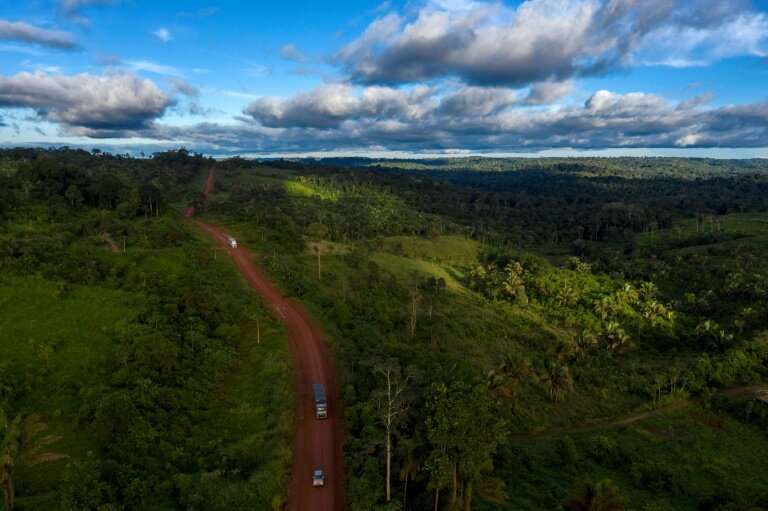
Just off the red-dirt highway, loggers have bored their way into the rainforest using heavy machinery.
Destroying everything in their path, the brazen looters are in no hurry to remove the timber, leaving it to be collected another day.
"When they are caught in the act, they say that these lands belong to no one, that the Indians are idiots, that they are lazy because they don't want to plant soybeans," says Tatji Arara.
'Escalating tensions'
The 566 indigenous territories demarcated by the Brazilian government represent more than 13 percent of the huge country's surface area.
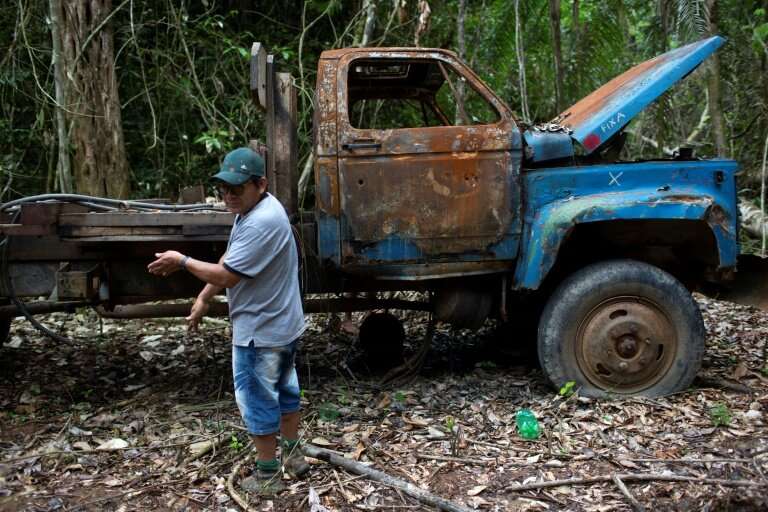
Since 1988, indigenous land rights have been recognized in Brazil's constitution, which forbids any activity— such as mining exploration or timber extraction—that threatens traditional ways of life.
But mines and energy minister Bento Albuquerque hinted in early March at a meeting with major mining companies in Canada that Brazil may end these restrictions.
Local prosecutor Adriano Augusto Lanna de Oliveira fears a bloodbath is looming.
"We are witnessing an escalation of tensions, and indigenous people are often forced to fulfill the role of federal law enforcement, who are far and few between," he says
"It's very disturbing to see the Indians playing the role of the police because they are often crushed in this kind of conflict," adds Paulo Henrique Cardoso, another prosecutor in Altamira.
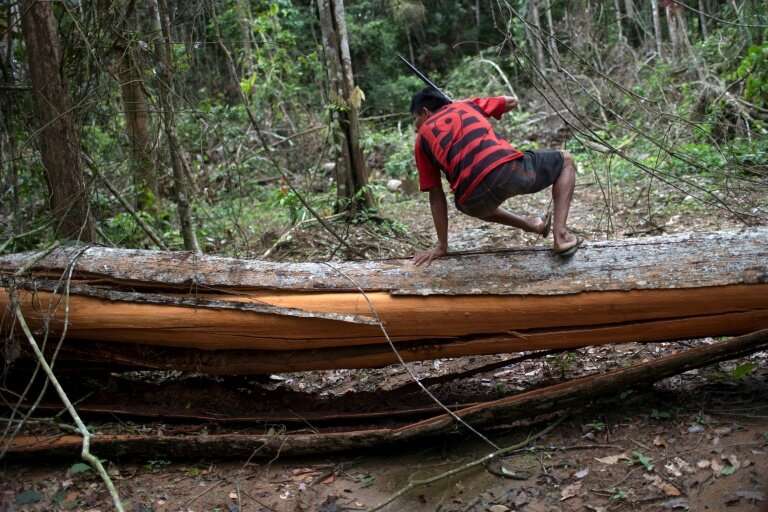
Conflicts over land in this region also have left claimed the lives of several human rights activists such as Dorothy Stang, an American missionary murdered in 2005 at the age of 73.
'Blood and tears'
"Altamira is a town flooded with blood and tears," says Antonia Melo, 69, who heads the activist group Xingu Alive Forever.
"Unfortunately the situation, which was already deplorable due to the irreversible consequences of the Belo Monte dam, worsened with the election of Bolsonaro," says Melo, who keeps photos of Stang and other murdered activists in her office.
"He was elected with hate speech and now that he is in power, the timber traffickers and the big landowners have become emboldened."

Last month, government secretary Carlos Alberto dos Santos Cruz went to Altamira to meet with indigenous leaders.
He promised to seek back-up for the federal police and environmental organizations in the fight against deforestation.
But dos Santos Cruz rejected suggestions that Bolsonaro's anti-environment rhetoric had fueled incursions into indigenous lands.
"That is an absurd interpretation—the president's language has always been respectful of the law. This invasion of any land, indigenous or not, is intolerable," he said.
But Arara leader Surara Parakana—who attended the meeting in Altamira, his cheeks painted with traditional motifs—remains skeptical and wants to see more concrete measures.
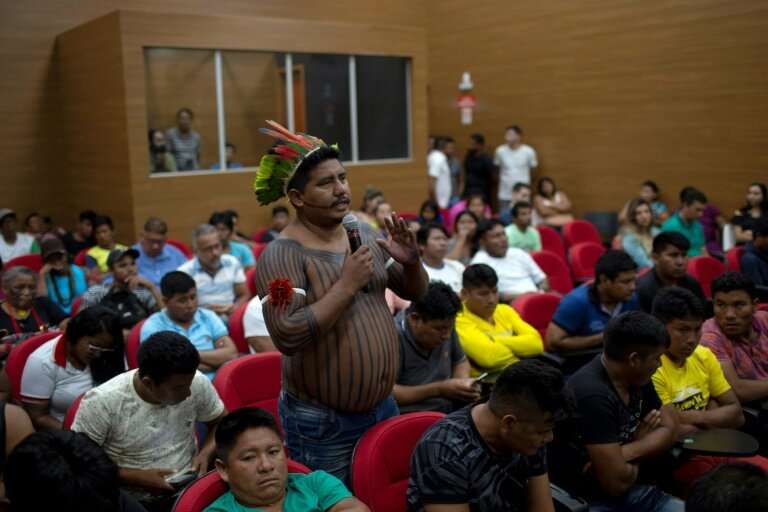
"The government must act," he says.
"Our forest provides oxygen to the whole world, not just the Indians."
© 2019 AFP



















